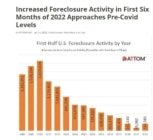The answer of course is yes, you can roll credit card debt into a mortgage – but whether it is the best solution for you depends on a variety of factors, including your mortgage interest rate, your equity level, your verifiable income, and your credit score. How often it ends up being the right solution though will surprise you.
In this blog, we will explore how rolling credit card debt into a mortgage works and how the above factors should impact your decision.
What Is Debt Consolidation?
Debt consolidation is a financial strategy that involves combining multiple debts into a single loan with a potentially lower interest rate and/or a simpler payment structure. This approach allows individuals to manage their debt more efficiently by making one monthly payment instead of several to different creditors.
By consolidating various forms of high-interest debt, such as credit card bills, personal loans, and other liabilities, into one loan with a lower interest rate, borrowers can reduce their total monthly payments and ease the management of their finances. This method is especially beneficial for those looking to streamline their debt obligations, improve their cash flow, and/or reduce the financial stress associated with managing multiple debts.
What Does It Mean to Roll Credit Card Debt into a Mortgage?
Rolling credit card debt into a mortgage refers to the process of refinancing your existing home loan with a larger mortgage and using the extra funds derived from the increased loan amount to pay off your high-interest credit card debts. This is typically achieved through a “cash-out refinance.”
Cash-Out Refinance Explained
In a cash-out refinance, homeowners apply for a new mortgage that is greater than the balance of their existing mortgage. The difference between these two amounts is taken as cash, which can then be used to pay off credit card balances or other debts. For instance, if you owe $400,000 on your mortgage and get approved for a refinance of $450,000, you can use the additional $50,000 to eliminate or reduce your credit card debt.
Advantages of This Approach
There are several significant potential benefits from rolling your credit debt into a mortgage:
- Lower payments: By rolling their short-term credit card debt into a longer-term mortgage that amortizes over 30 years, most borrowers get substantial payment relief.
- Lower rates: Mortgage interest rates are almost always significantly lower than credit card and other consumer debt rates.
- Single Payment: The benefit from having to manage a single payment instead of multiple payments cannot be overstated.
- Tax Benefits: There are potential tax benefits from turning your credit card debt into mortgage debt, but you should consult with your CPA to confirm the viability of this potential benefit.
Interesting Sidebar: Despite record high interest rates, an average of about 140,000 people refinanced ever month in early 2024 – and the primary reason was to take cash out to pay off credit card debts.
Three Ways To Tap Into Your Home Equity
There are three ways you can tap into your home equity – with three different types of mortgages.
Home Equity Loan
A home equity loan provides you with a lump sum of cash based on your home equity. It’s a “second mortgage” with its own fixed interest rate and monthly payment schedule. You can use this loan to pay off your credit card debts, and then you’ll only have the home equity loan to repay. These loans reduce your overall payments by often reducing your interest rate and extending your repayment term (typically to twenty years).
Home Equity Line of Credit (HELOC)
A HELOC works like a credit card secured against your home. It offers a revolving credit line that you can draw from as needed. The interest rates are typically lower than those of credit cards, making HELOCs a cost-effective way to manage debt. Payments can also be “interest only,” offering additional payment relief. These too are usually “second mortgages,” meaning that they’re recorded behind your first mortgage.
Cash-Out Refinance
A cash-out refinance involves refinancing your current mortgage for a larger amount than what you owe and taking out the difference in cash. This cash can then be used to pay off credit card debt. While this option sometimes comes with the benefit of a lower interest rate compared to your original mortgage, its more consistent benefit is that it extends the repayment period of your consumer debt to 30 years – offering substantial relief from high monthly payments.
Considerations When Deciding What Type of Loan To Get
Required Credit Score
You will need a credit score of 680 or higher in many cases to get a Home Equity Loan or a Home Equity Line of Credit. You can, however, get an FHA cash out mortgage with a credit score as low as 580. This is very important, given that people looking to pay off their credit cards could have slightly impaired credit.
Necessary Income
Unless you have substantial equity in your home, you will likely need to verify sufficient income to qualify for a mortgage. The good news is that many mortgage lenders will allow you to “pay off debt” to qualify for your mortgage, meaning that your mortgage loan will be underwritten with the assumption that the cash derived from your new mortgage will be used to pay off your consumer debts. In addition, there are also mortgage loans that accept alternative types of income documentation, such as a twelve-month average of the deposits on your bank statements.
Necessary Equity Levels
If your credit score is high enough, Home Equity Loans and Home Equity Lines of Credit will lend up to a 95% combined loan-to-value (CLTV) in some cases, meaning that you will only need to have a 5% equity cushion. These loans, however, are more often capped at 90% combined loan-to-value. If your credit is impaired though, you can still get an FHA cash-out mortgage up to 80% loan-to-value, meaning that you only need a 20% equity cushion after your loan funds.
Closing Costs
The drawback to mortgage refinances relative to other solutions for excess credit card debt is that refinances involve closing costs – typically in the $3,000 to $4,000 range. These costs, however, can often be rolled into the loan and/or covered by a lender credit (in exchange for a slightly higher rate). In addition, the savings that result from a cash-out refinance can often offset the closing costs in a short period of time.
How Do I Decide What Type of Mortgage I Should Get?
If the rate on your first mortgage is low, you should consider a second mortgage in the form of a home equity loan or a home equity line. Obtaining one of those loans will preserve your first mortgage and your first mortgage interest rate. If, however, your credit score is below 680, or if you have a significant amount of consumer debt to pay off, a new cash out first mortgage will often be a much better solution – even if the interest rate for your current mortgage is relatively low compared to the current rate environment.
Second mortgages are also stricter when it comes to verifying sufficient income to qualify, so you may have to consider a first mortgage instead of a second mortgage for income documentation reasons as well. If you have significant amounts of equity in your home (of 35% or more), there are first mortgages available that allow for alternative income documentation or no income verification at all in some cases.
How Can This Help My Financial Situation?
Consolidating high-interest credit card debt into a mortgage with a lower interest rate can have several positive effects on your financial health, many of which were discussed above.
Reduced Monthly Payments
Extending your repayment over 30 years and lowering your interest rate can significantly lower your overall monthly payment obligations. This reduction in monthly payments can free up cash flow, allowing you to allocate funds to other expenses, savings, or investments.
Simplified Debt Management
Having multiple credit card payments can be cumbersome and difficult to manage. By consolidating all your credit card debts into one mortgage payment, you streamline your monthly bills into one predictable payment. This consolidation helps reduce the chance of missing payments, which can adversely affect your credit score.
Improvement in Debt-to-Income Ratio
The debt-to-income ratio (DTI) is a key metric that lenders use to evaluate your ability to manage monthly payments and repay debts. By rolling your credit card debt into your mortgage and lowering your monthly debt payments, you can improve your DTI ratio. A lower DTI ratio enhances your creditworthiness in the eyes of lenders, which can be beneficial if you need to apply for new credit or loans in the future.
Risks of Rolling Credit Card Debt into a Mortgage
While there are many benefits, there are also some risks or drawbacks to consider.
- Increased Loan Term: Spreading your credit card debt over the term of your mortgage could mean paying more interest overall due to the extended repayment period.
- Home at Risk: By securing your previously unsecured credit card debt against your home, you risk foreclosure if you default on your mortgage payments – although this risk is minimal, particularly if you are reducing your overall monthly obligations.
- Potential for More Debt: If not coupled with disciplined spending habits, consolidating debt can lead to a false sense of financial relief and potentially more debt accumulation.
While these potential drawbacks are not significant, they are nonetheless important considerations.
Can I Get a Cash Out Mortgage With Existing Credit Card Debt?
Yes, you can get a mortgage even if you have existing credit card debt and your current debt ratios are very high. This is because many lenders allow you to “pay off debt to qualify,” meaning that they will underwrite your loan under the assumption that your debts will be paid off in escrow with case proceeds from your new mortgage.
What Should I Consider Before Consolidating My Credit Card Debt into a Mortgage?
Before moving forward with consolidating your credit card debt into a mortgage, a thorough evaluation of your financial landscape is essential. Here are some critical factors to consider:
Home Equity
Evaluate the amount of equity you currently have in your home. This is pivotal because you’ll need sufficient equity to not only cover your existing debts but also to meet your lender’s loan-to-value (LTV) requirements. The LTV ratio is a measure used by lenders to determine risk before approving a loan; the more equity you have, the less risky the loan appears to them.
Interest Rates
Analyze the interest rates from various perspectives:
- Current Mortgage vs. New Mortgage Rate: How does your existing mortgage rate compare with the proposed rate on a new loan?
- Credit Card Rates vs. Mortgage Rate: Consider the average interest rate you are paying on your credit cards compared to what you will be offered on the mortgage. This will help you assess the potential savings from the consolidation.
Note: The more consumer debt you have, the less the current mortgage interest rate environment matters. Some borrowers with substantial credit card debt can refinance into a much higher interest rate and still save thousands of dollars each month.
Financial Stability
Assess your job security and income stability, as these are crucial for managing increased loan responsibilities. Ensure that you can comfortably afford the new mortgage payments without compromising your financial health, especially in the face of unexpected expenses or economic downturns. If you are, however, paying off a substantial amount of credit card debt, your financial stability will be enhanced significantly.
Long-Term Financial Goals
Think about how this debt consolidation fits into your larger financial strategy. Are you trying to free up cash to save for retirement, invest in education, or purchase additional property? Ensure that consolidating your debt aligns with these long-term objectives, enhancing your financial position rather than undermining it.
How Do I Begin the Process of Rolling My Credit Card Debt into a Mortgage?
Once you decide that consolidating your credit card debt into your mortgage is the right strategy, here’s how to initiate the process:
Step 1: Consult a Trusted Mortgage Lender
Start by consulting with a reputable mortgage lender who can provide personalized advice tailored to your financial situation and offer competitive refinancing rates. You also want to ensure the lender has substantial experience with cash-out loans and that every possible loan product is available to ensure you are matched with the best loan for your needs.
Step 2: Prepare Your Financial Information
An experienced mortgage advisor will help you with this, so you do not need to worry about being particularly accurate. Below is some of the information you should have when you consult with a mortgage advisor.
- Approximate list of Debts: Compile a list of all debts you intend to consolidate. Your estimated current mortgage balance and the related interest rates for all of your debts would be helpful as well.
- Estimated Credit Score: Your approximate credit score would be helpful too for the initial conversation, but your mortgage advisor will also pull your credit to get an accurate score. Please keep in mind that “consumer credit scoring models” like you find online often provide scores that are too high or inaccurate for mortgage purposes because they use different scoring criteria.
- Approximate Income: Lenders will request necessary income documentation and do an exact analysis. But, you should know your approximate total income (salary plus bonuses plus other sources of income) for your initial conversation.
- Estimated Home Value: Your lender will order a formal appraisal if debt consolidation makes sense, and you ask them to move forward. But, you should know your approximate home value for your initial conversation.
By carefully preparing and considering these aspects, you can approach the debt consolidation process with confidence, knowing that you are making a well-informed financial decision.
Frequently Asked Questions
Is rolling credit card debt into a new mortgage different from a refinance?
Yes, rolling debt into a new mortgage typically involves purchasing a new home and incorporating debt into the initial mortgage, while refinancing pertains to restructuring your current mortgage to include existing debt.
How much equity do I need to have to do a debt consolidation mortgage?
If your credit score is high enough and you qualify for second mortgage, you will need as little as 5% to 10% of equity remaining when your loan funds. This means that your current mortgage, plus all the debt you want to pay off, plus your closing costs should not exceed 90% to 95% of the value of your home. If your credit score is lower than 680 and you have to get a new first mortgage or if you simply want a new cash-out first mortgage for other reasons, you will need an equity cushion of at least 20% when your cash-out loan funds.
What is the minimum credit score I need for a debt consolidation mortgage?
A credit score of 680 is required for a second mortgage, but it can be as low as 580 for an FHA cash-out first mortgage.
Will consolidating my credit card debt into my mortgage impact my credit score?
Initially, your credit score might dip slightly due to the hard inquiry from your loan application. However, paying off your credit card balances could positively impact your score over time. Paying off a significant amount of high-balance credit card debt could, in fact, push your credit score up as much as 100 points.
Can rolling credit card debt into my mortgage save me money?
Yes, rolling your consumer debts into your mortgage can save you hundreds if not thousands of dollars every month, both because you are extending out your payments and because you will be lowering your effective interest rate in many cases too.
What if I have other types of debt, like student loans?
Depending on the lender and your financial situation, it might be possible to include other types of debt in your refinance. Discuss these options with your lender.
What if my credit is so bad that I won’t qualify for a mortgage?
If you have substantial equity of 35% to 40% or more, you likely will be able to qualify for a mortgage irrespective of your credit score. FHA guidelines are also very flexible when it comes to credit, particularly if you have enough equity to pay off much of your credit card debt and substantially lower your monthly payments.
What if I cannot make my payments and I have too little equity to qualify for a mortgage?
You should consult with a bankruptcy attorney. While bankruptcy can severely impact your credit, it can also provide the relief and fresh start you might need.
The Bottom Line
When considering rolling credit card debt to your mortgage, choosing a lender that understands your needs is an absolute necessity. JVM Lending offers a transparent, customer-focused approach that can help you navigate the complexities of mortgage refinancing – while also having access to every type of mortgage option available. Whether you’re looking to reduce your monthly payments, save money, or simply streamline your finances, JVM Lending is here to help, without overwhelming you with sales pressure. Explore your options with JVM Lending and make an informed decision that aligns with your financial goals.
If you need more information about how to use your mortgage to help manage your credit card debt, contact JVM Lending at (855) 855-4491 or email [email protected].





















